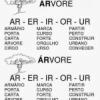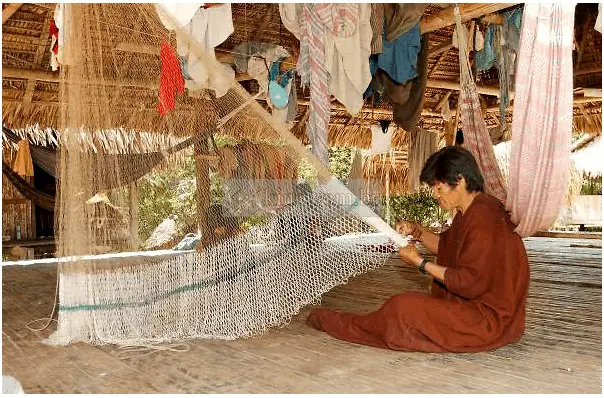
Portuguese Activity, suitable for 9th grade students, proposes, among other issues, the observation of the compound noun, present in the interesting text Mathematics and indigenous cultures.
This Portuguese language activity is available for download in an editable Word template, ready to print in PDF and also the completed activity.
Download this activity from:
SCHOOL: DATE:
PROF: CLASS:
NAME:
Read:
Today there are respectful intentions written in the Brazilian Constitution of 1988, which recognizes for indigenous cultures the right to live and grant them the right to territories and education differentiated.
In fact, indigenous cultures in general have a harmonious relationship with nature and, from this coexistence, these peoples enrich their culture and make it different. Among the many aspects of indigenous culture, we highlight here some observations on the perception of Mathematics in nature.
For example, from the simple observation of plants, flowers, fruits and seeds, these people are able to perceive geometric designs.
Other mathematical concepts, such as the need to obtain measurement units, can be observed in the execution of everyday tasks such as building canoes and fishing nets.
Some peoples, such as the Tuyuka, use the width of a finger as a unit of measurement for the thickness of canoes and are able to discuss how to assess the distance and position of seats in a canoe.
Observing the customs of this tribe, it is possible to notice that for the construction of fishing nets, these people need instruments to obtain standard measures and use standard rods that allow the mesh size of each network to be kept constant. specific.
With the development of their own measurement system, they are able to “order” the various types of nets and also correlate them with the sizes of fish they intend to catch.
BAZIN, Maurice. In: indigenous culture.

In the photograph, the Ashaninka Indian weaving a fishing net.
Available in: http://kino.photoshelter.com.
Question 1 - The text above is:
a) journalistic
b) didactic
c) advertising
d) academic
Question 2 - "[…] and The make it differentiated.”. The highlighted term replaces:
the education
b) relationship
c) nature
d) culture
Question 3 - “[…] can be observed in the execution of everyday tasks like the construction of canoes and fishing nets.”. In this excerpt, the connective “how” introduces:
a) a comparison
b) an enumeration
c) an example
d) a conclusion
Question 4 – Watch:
standard rod - standard rods
Mark the compound noun whose plural follows the above rule:
a) postcard
b) tuesday
c) umbrella
d) time bomb
Question 5 - Reread this excerpt:
“In fact, indigenous cultures in general has a harmonious relationship with nature […]”.
a) Identify which subject the above underlined verb refers to:
b) Justify the circumflex accent in that verb:
By Denyse Lage Fonseca – Graduated in Languages and specialist in distance education.
At answers are in the link above the header.
 report this ad
report this ad

